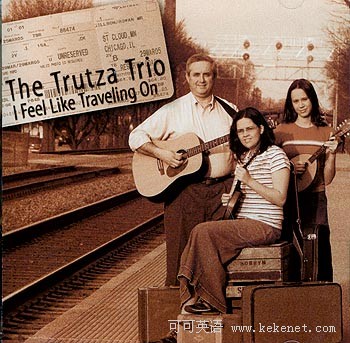(单词翻译:单击)
Monica: Hi, Brian, what's with the suitcase?
Brian: I've decided to go on a trip.
Monica: Are you leaving today?
Brian: No, I just bought this suitcase today for the trip. I'll take it home tonight.
Monica: Where are you going on your trip?
Brian: To Beijing.
Monica: Beijing, in China? Are you going alone?
Brian: No, I'm going with Lily.
Monica: Really! She'll be very excited.
讲解:
1. trip, journey, voyage 和 travel的区别:
(1) trip:是旅行和访问的总称,它是最常用的一个,经常用来代替 travel 。
比如: How long does the trip last?这次旅行将历时多久?
He makes frequent trips to London on business.他经常出差去伦敦。
(2)journey:常指去访问某地并从访问过的地方回来的整个行驶过程,一般指陆地上的旅行,而且有预定的地点。比如:We had a terrible journey. 我们的这次旅行糟糕透了。
(3)voyage:专指横跨海洋的水上远程旅行,常常到达一个遥远的国家,现在也可指空中旅行。比如:
He is going on a voyage round the world. 他打算去环游世界。
(4)travel:泛指旅行。比如:travel industry 旅游业 travel service/travel agency旅行社
We traveled for over fifteen hours. 我们旅行了15个小时以上了。
2. suitcase,旅行箱,行李箱,例如: Linda put clothes in a suitcase to get ready for her trip.林达收拾好衣服放进行李箱准备去旅游了。 再补充一个pack这个词,动词,打包的意思。例如: I need to pack my suitcase for the trip. 我要去旅游得开始打包了,就是得开始收拾行李了。还可以简单地说, I have packed for my trip. 我已经收拾好行李了。
3. What's with the suitcase?当中的What's with something or somebody? 表示某事某物是怎么回事,比如: What's with the TV?那台电视机是怎么回事? What's with Tom today? He looks so weird. 今天汤姆是怎么了? 看起来怪怪的。
4. go on a trip.表示去旅行,后面再加一点东西,就变成 go on a trip to some place, 例如:I'm going on a trip to Europe. 我要去欧洲旅行。
5. go alone自己去;go with somebody和某人去。
对话2
Dialogue Script 2 对话原文 2
Susan:Hi, David, getting ready for a vacation in the States?
David: Hello, Susan. Oh, yes, I'm just checking with my baggage.
Susan: You must be very excited about it. Where are you visiting in the States?
David: Los Angeles. Our headquarter is there.
Susan: Have you ever been there before?
David: No, never. This is my first time.
Susan: Are you gonna visit New York?
David: Yes, I'll spend a couple of days there too.
Susan: Have you gotten your plane tickets yet?
David: Yes, it's right in the envelope over there.
Susan: You already made a hotel reservation?
David: Yes, a single room.
Susan: And your passport and visa?
David: All settled.
David: Incidentally, is there anything you want me to get for you in the states?
Susan: That's very kind of you. But no, thanks.
David: OK, then can you do me a favor?
Susan: Yes?
David: Can you water my plants and take care of my cat?
Susan: Sure, I'll even talk to them every morning like you do.
讲解:
1. 这段对话讲的是David正在准备去美国的旅行。里面提到了一些旅行前需要准备的事情。首先要检查行李,看看东西都带齐了吗。(I'm checking with my baggage.)check with something 检查某物。例如: Check with the gas before you go out. 出门前检查一下煤气有没有关好。
2. baggage表示行李,但是它的范围就比suitcase 大了,包括旅行袋、 包裹等等,和她差不多的还有luggage这个词,不过美语当中baggage用的多一些。
3. 行李检查好了,再看看机票在没在手里。(Have you gotten your plane ticket?)plane ticket 机票,往往要提前几天预订,如果赶上旅游旺季还要提前几个月预订.
4. Susan 问David酒店房间预定好了没有,(You already made a hotel reservation?) make a reservation 预订\定位子。 例如: Peter made a dinner reservation for 6:00 p.m. on Friday. 彼得定了周五晚上六点吃饭的位子。
5. 出国一定要有本国护照和那个国家的签证。护照是passport,签证是visa。这些都是要提前办理的。
6. 几个跟旅游有关的常用句型:
(1) I have (never) been to.../here/there before. Have you ever been to.../here/ there before?
我去过...,我没去过...,还可以问你去过哪没有?
例如: Have you ever been to Paris before? 你以前去过巴黎吗?
Yes, I've been there twice.去过两次了。 / No, never. 从来没去过。
(2) this is the first time I have been in.../here/there.
这是说我第一次到..., 用现在完成时。也可以说好多次,就是把first换成second third,等序数词就行了。或者夸张一点说,This is the thousandth time I have been there! 对话里把后面的现在完成时省略掉了。



